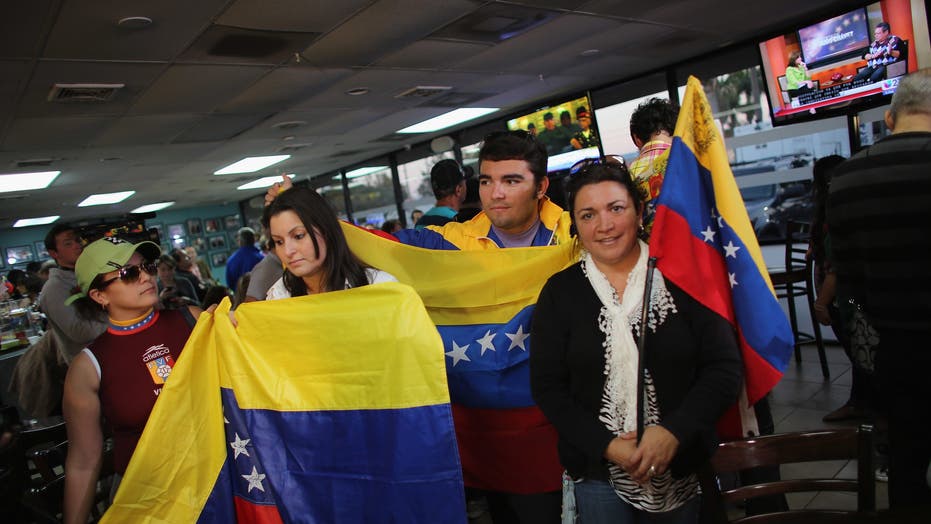CARACAS, Venezuela – With the date set to pick the replacement for Hugo Chávez, all eyes in Venezuela are on Election Day.
And since Chávez’s hand-picked successor Nicolas Maduro is already the official party candidate, just one big question remains: Who will be his opponent?
On late Sunday opposition leader Henrique Capriles will announce his intentions in what could be the most important decision of his political life. He faces a stark choice: run in the April 14 vote many believe he is sure to lose amid a frenzy of sympathy and mourning for the dead president, or stay on the sidelines and risk his leadership of the opposition.
Some say a second defeat for the 40-year-old state governor just six months after he lost last year's presidential vote to Chávez could derail his political career. If he waits, a Chavista government led by Nicolas Maduro, the acting president, might prove inept and give him a better shot down the road.
On a personal Twitter page that bore all the rah-rah adornments of a campaign site, Capriles wrote Saturday afternoon: "I am analyzing the declaration of the (electoral commission setting the date) and in the next hours I will talk to the country about my decision." A spokesman said Capriles would make an announcement in the early evening.
Whoever the opposition runs, analysts predict the next five weeks will increase the nasty, heated rhetoric that began even before Chávez's death Tuesday after a nearly two-year fight with cancer.
Maduro, who was named Chávez's vice president after the October election, was sworn in as this oil-rich country's acting leader Friday night and has made clear he will be the ruling party candidate. He is expected to file election papers on Monday.
Really what this campaign would be about is allowing the opposition to put themselves in position for the future, to show that they have some ideas for the country.
Opposition critics have called Maduro's ascension unconstitutional, noting the charter designates the National Assembly president as acting leader if a president-elect cannot be sworn in.
Angel Alvarez, a political science professor at the Central University of Venezuela, said Capriles is well aware that "the dice are loaded in favor of the government's candidate."
That means sitting out the race would make sense for Capriles, said David Smilde, an analyst with the U.S.-based think tank the Washington Office on Latin America.
"If he says he doesn't want to run I could totally understand that," Smilde said. "He is likely going to lose and if he loses this election he's probably going to be done."
On the streets of Caracas on Sunday, opinion was as divided as always in a country that became dramatically more polarized during Chávez's 14-year rule.
"It's not fair," said Jose Mendez, a 54-year-old businessman of the choice the opposition leader faces. "(Maduro) has an advantage, because of everything they have done since Chávez's death, all the sentiment they've created ... But the guy has nothing. He can't hold a candle to Chávez."
But Ramon Romero said the opposition was just making excuses, and had no chance of victory in any case.
"Now their odds are even worse," said the 64-year-old waiter and staunch Chávez supporter. "They don't care about anyone, and we (the voters) have been lifted out of darkness."
There was no indication that the opposition would sit out the vote altogether. A boycott of 2005 legislative elections was widely seen as disastrous for the opposition. In possession of every single seat, Chávez's camp was able to extend its hold on government, including stacking the Supreme Court with loyalists.
If Capriles does stay out, analysts say, the opposition would be wise to run fresher faces such as Caracas Mayor Antonio Ledesma or Henry Falcone, governor of Lara state and one of just three opposition governors. That would give them the opportunity to clearly articulate a platform and vision without damaging its top star. Capriles garnered 44 percent of October's votes, which was the most anyone had won against Chávez since he took office.
"Really what this campaign would be about is allowing the opposition to put themselves in position for the future, to show that they have some ideas for the country," Smilde said.
Based on reporting by the Associated Press.
Follow us on twitter.com/foxnewslatino
Like us at facebook.com/foxnewslatino





